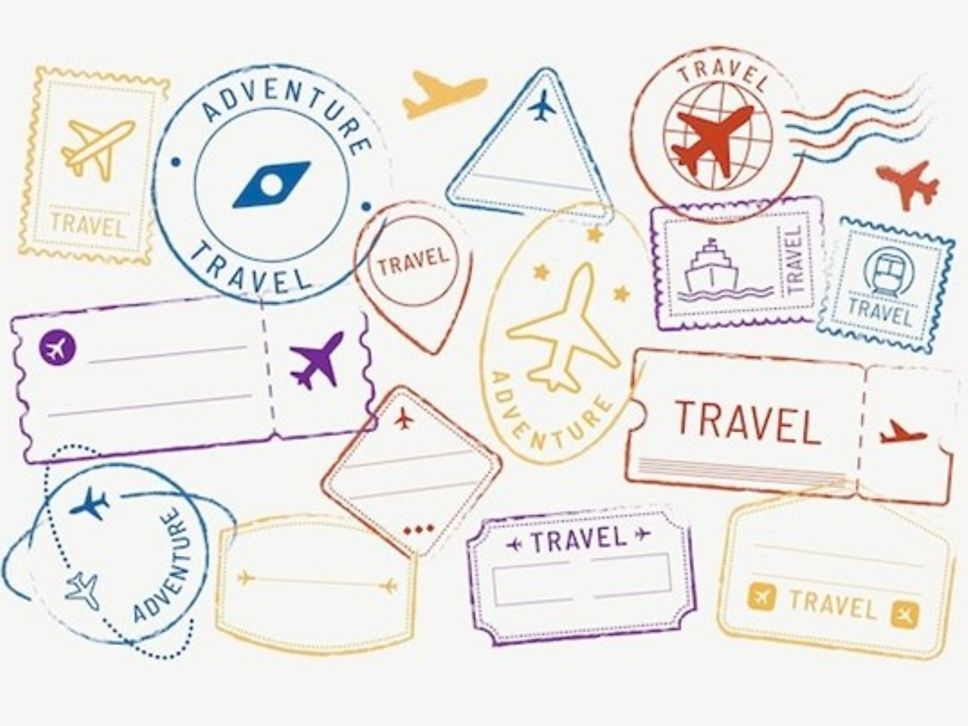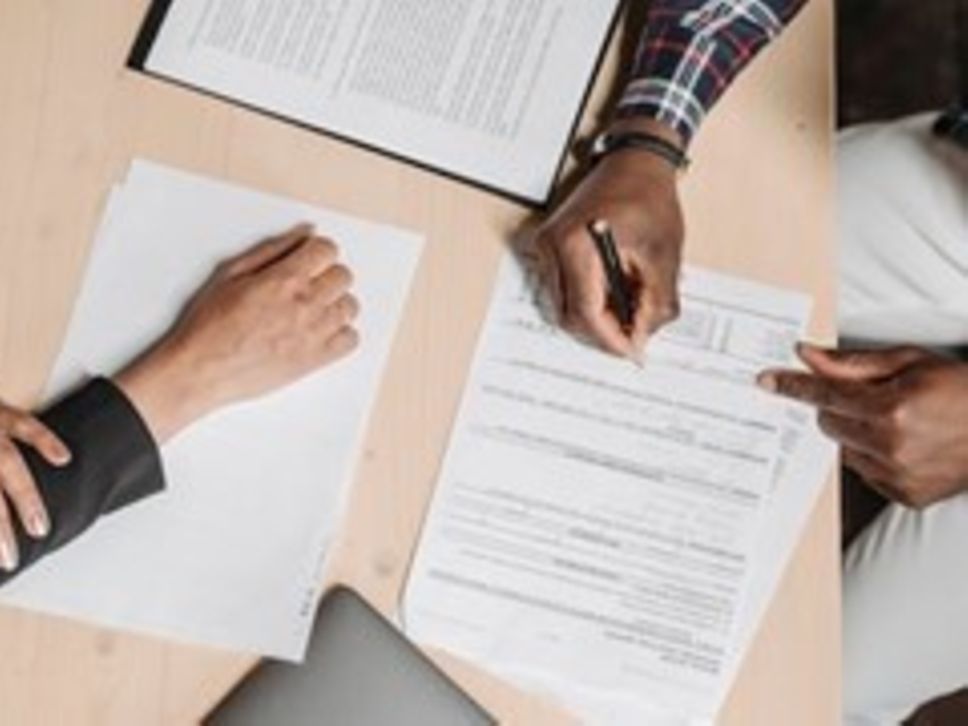Article: Not yet arrived in Germany?
Welcome to Team DB! We are delighted to welcome you to the rail family. Before your first day at work, there are still a few things to do. We will guide you through them step by step:
Preparations
Learning German

To start work at DB, you will usually need sufficient German language skills, which can vary depending on the job.
Applying for a visa

If you are not a citizen of an EU or EEA country, please ensure that you have a valid work visa before starting your employment.
If you are a citizen of an EU country, you do not need a visa or residence permit to work in Germany.
Moving to Germany

When you move into your accommodation, make sure your accommodation provider gives you an official confirmation (Wohnungsgeberbestätigung). Additionally take note of your Wohnungsführerschein.
Mastering the formalities

You will probably have several appointments with the authorities during your first few days in Germany. These will normally take place in the following order:
1. Register your address at the registration office (Einwohnermeldeamt).
2. Open a bank account.
3. Apply for the conversion of your visa into a residence permit at the immigration office (Ausländerbehörde) (not relevant for EU/EEA citizens).
You can find important information about this in our welcome brochure.
Getting started in Germany
To help you prepare for your arrival in Germany and make it easier for you to get started, we have summarised the most important information on how to prepare for your first day at work.

Learning German
To make it easier for you to get started in the German language, we offer you initial language courses in your home country. This allows you to start learning German before you arrive in Germany. Together with you, we identify the language course that best suits you and that will get you ready to start at DB.
Our language offering for future DB employees includes general language and rail-specific language courses in various formats, including online, face-to-face and WBT (web-based training):
General language courses
- Online language courses in your home country with our local partners
- Language qualification in cooperation with the Goethe-Institut (for A1 to C1; WBT)
- Self-study via Speexx (for A1 to C1; 6-month access)
Specialist and rail-specific courses – Online
- Language skills for everyday working life – A1 to C1
You can also find an overview here of free online courses to give you additional help learning German:
- Free online German course, learn German grammar and practise free of charge - DeutschAkademie Level A1 to C1
- Registration for B2 at: Deutsch am Arbeitsplatz - Goethe-Institut DaF
- Practise German for free - Goethe-Institut
- Learn German on the Internet for free - deutsch.info
- German courses | DW Deutsche Welle
- Interact with others
- Very good free app available
- Many explanatory videos
- Different learning content (e.g. news reports spoken slowly)
- vhs-Lernportal - German courses
- Level A1 to C1
- Including offline app
- Learn German for FREE (How to Reach B1 Without Expensive Courses)
Examples of YouTube channels:

Applying for a visa
For EU and EEA citizens: If you have EU/EEA citizenship, you benefit from the free movement of workers within the EU countries. This means that you do not need a visa to work in these countries. This applies to nationals of both the European Union and the member states of the EEA.
You do not require a visa to work at DB in Germany, as Germany is a member of the European Union. Nationals of EU and EEA countries can work in Germany without a visa.
Member states of the EU (European Union) are: Austria, Belgium, Bulgaria, Croatia, Cyprus, the Czech Republic, Denmark, Estonia, Finland, France, Germany, Greece, Hungary, Ireland, Italy, Latvia, Lithuania, Luxembourg, Malta, the Netherlands, Poland, Portugal, Romania, Slovakia, Slovenia, Spain and Sweden.
Member states of the EEA (European Economic Area) are: the member states of the European Union plus Iceland, Liechtenstein and Norway
For employees from third countries: Nationals of third countries, i.e. non-EU/EEA countries, require a valid residence permit that allows them to work in Germany. There are both temporary and permanent residence permits in Germany. Which visa is suitable for you depends on your professional qualifications, work experience and future job. Your local recruiter will help you choose the right visa. You can find an overview of the different types of visas on the Make It in Germanywebsite.
You can find guides to help you complete the VIDEX visa application forms in various languages by clicking this LINK. We are continuing to add new languages.
If you need recognition of your professional qualification for your visa:
In many cases, recognition of your qualification is a prerequisite for your visa. If your qualification has not yet been (fully) recognised, we will be happy to support you before and during the recognition process. Here you can find information on the recognition process. You can find an overview of the relevant contact persons here.

Moving to Germany
Germany is a diverse place with a lot to offer. To help you quickly feel at home here, we have put together some information about the country. If you would like more information about your future home – e.g. how to open a bank account or how the German social security system works – take a look at the brochure we have written for you.
Finding your first place to live in Germany can be very difficult from outside the country. Temporary accommodation that comes already furnished is therefore often ideal while you are finding your feet in a new city.
Temporary housing from DB
DB apartments are currently available for short-term rental in six cities. With all DB apartments, you benefit from an unusually flexible rental period, and you only need to give one month's notice when you want to leave. Further information is available here.
When you move into your accommodation, make sure your accommodation provider gives you an official confirmation (Wohnungsgeberbestätigung). Additionally take note of your Wohnungsführerschein
Mastering the formalities
During your first few days in Germany, you will likely have to attend various appointments with the authorities. During your first few days in Germany, you will have to attend various appointments with the authorities. You must normally complete these formalities in the following order:
1. Register your address at the registration office (Einwohnermeldeamt)
After entering Germany, you must register your address at your local registration office (Einwohnermeldeamt) within 14 days. A first appointment will be automatically arranged for you and can be found in your onboarding schedule.
In order to register, you will usually need the following documents, which may vary slightly depending on your local registration office:
- Identity document such as your passport or identity card
- Registration form, which you can usually obtain from the website of your local registration office
- A signed confirmation (Wohnungsgeberbestätigung) from your housing provider/landlord
- If applicable marriage certificate, birth certificate of the child
2. Open your bank account
If you are arriving from a third country (or an EU country outside the SEPA area and the Eurozone) and do not yet have a bank account in Germany, you will need a German bank account in order to receive your salary. You can only open an account at your chosen bank once you have successfully registered your address at the registration office. One DB Plus partner is Sparda Bank, where opening an account is a simple process.
3. Convert your visa into a residence permit at the immigration office (Ausländerbehörde) (not relevant for EU/EEA citizens)
If you have a national visa, it should be converted into a residence permit at least six weeks before it expires. You must apply for the residence permit at your local immigration office (Ausländerbehörde). Use the public service finder to find out which immigration office is responsible for you. If you have any questions or problems with the application process, please contact SUKI. The SUKI team will be happy to help you with your residence permit application.
You can find important information about this in our welcome brochure.

Mastering the formalities
During your first few days in Germany, you will have to attend various appointments with the authorities. You must normally complete these formalities in the following order:
1. Register your address at the registration office (Einwohnermeldeamt)
After entering Germany, you must register your address at your local registration office (Einwohnermeldeamt) within 14 days. A first appointment will be automatically arranged for you and can be found in your onboarding schedule.
In order to register, you will usually need the following documents, which may vary slightly depending on your local registration office:
- Identity document such as your passport or identity card
- Registration form, which you can usually obtain from the website of your local registration office
- A signed confirmation (Wohnungsgeberbestätigung) from your housing provider/landlord
2. Open your bank account
If you are arriving from a third country and do not yet have a bank account in Germany, you will need a German bank account in order to receive your salary. You can only open an account at your chosen bank once you have successfully registered your address at the registration office. One DB Plus partner is Sparda Bank, where opening an account is a simple process.
3. Convert your visa into a residence permit at the immigration office (Ausländerbehörde)
If you have a national visa, it should be converted into a residence permit at least six weeks before it expires. You must apply for the residence permit at your local immigration office (Ausländerbehörde). Use the public service finder to find out which immigration office is responsible for you. If you have any questions or problems with the application process, please contact SUKI. The SUKI team will be happy to help you with your residence permit application.
You can find important information about this in our welcome brochure.

Your contacts
We are happy to help you get started in Germany. You can find an overview of contacts here:
Application process, recognition of your professional qualification, residence permit prior to your employment, and adaptation qualification
- Your local recruiter
- Your HR business partner
- Your manager
Employment contract
- Your HR business partner
Conversion of your visa into a German residence permit, advice regarding partial recognition of your professional qualification
Global Mobility Helpdesk
Tel.: +49 (0)30 297 1048
E-mail: global.mobility@deutschebahn.com
Support with the immigration office, help finding accommodation and questions about integration and multiculturalism
Social and Cultural Integration (SUKI) project
Tel.: +49 (0)69 809076-288 (Monday to Friday from 8:00 a.m. to 3:00 p.m.)
E-mail: suki@stiftungsfamilie.de

